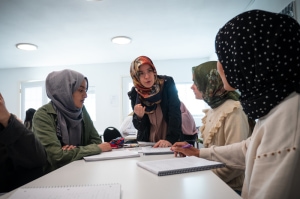Academics
Liberal Arts & The Trivium
The ultimate aim of education at Zaytuna College is the inculcation of the love of beauty, truth, and goodness in a human being. Muslims call the highest truth īmān, or a firm conviction of God’s existence and providence; we call goodness islām, or submission and resignation to God’s will and action in accordance with it, on earth as it is in heaven; and we term beauty iĥsān, which literally can mean “to make beautiful,” “to reflect beauty,” and “to perceive beauty.”
Each of these is reflected in the liberal arts of freedom taught at Zaytuna College. Grammar is man’s greatest good, logic makes him capable of recognizing truth and seeing falsehood in its absence, and rhetoric enables him to transmit beauty in all he does.
The trivium is the foundation of the College’s pedagogical mission. Its constituent disciplines—grammar, logic, and rhetoric, each of which is taught in both the Islamic and Euro-American traditions—are studied and repeatedly practiced by students throughout their four years of study, to achieve excellence in reading, writing, speaking, and reasoning.
A Campus Tour
Bachelor’s Degree in Liberal and Islamic Studies
Zaytuna’s bachelor of arts program is founded on an integral liberal arts curriculum, consisting of courses from both the Islamic and Euro-American traditions of higher learning.
Master’s Degree in Islamic Texts
Zaytuna’s master of arts degree in Islamic texts is intended to provide students with higher-level access to the Islamic tradition through a guided course of study in Islam’s primary sources.
What Our Students Say
“For anyone who yearns to nourish their intellect and revive their spirit; this is your opportunity. I have benefited immensely from belonging to 12000 Strong. The members-only book club with President Hamza Yusuf has expanded my heart and mind and awakened in me a love for critical thought anchored in spiritual depth.
The Prophet ﷺ said that the most beloved deeds to Allah are the most consistent ones, even if they are small. As members of 12000 Strong, consistent giving is our investment in a legacy of sacred knowledge, a sadaqa jariyah (ongoing charity) that will outlive us all.
May Allah make our monthly support a means of light in this world and the next. Ameen."
— Sara Baig
“A Zaytuna education addresses how to become a better citizen and human being. This distinguishes Zaytuna College from other North American colleges and universities: students learn that the blessings we are given come with a responsibility to give back. This essential aspect is entirely missing from higher education. Not once in any of the three universities I attended, including law school, did my professors address the responsibility of giving back to community.”
— Hussein Hamdani
“Supporting Zaytuna College becomes more important with each passing day. The work of connecting young Muslims to our rich history and living tradition, and teaching them to think critically and communicate persuasively, has never been more important.
As recipients of revelation and prophetic guidance, Muslims have a heavy responsibility in these challenging times. Humanity needs us to be good stewards of the guidance we have been given. We must become better leaders and followers and deliver to others what has been passed on to us . In every arena — as parents, neighbors, employees, and citizens — it is upon us to model a better way.”
— Zakaria Shaikh



